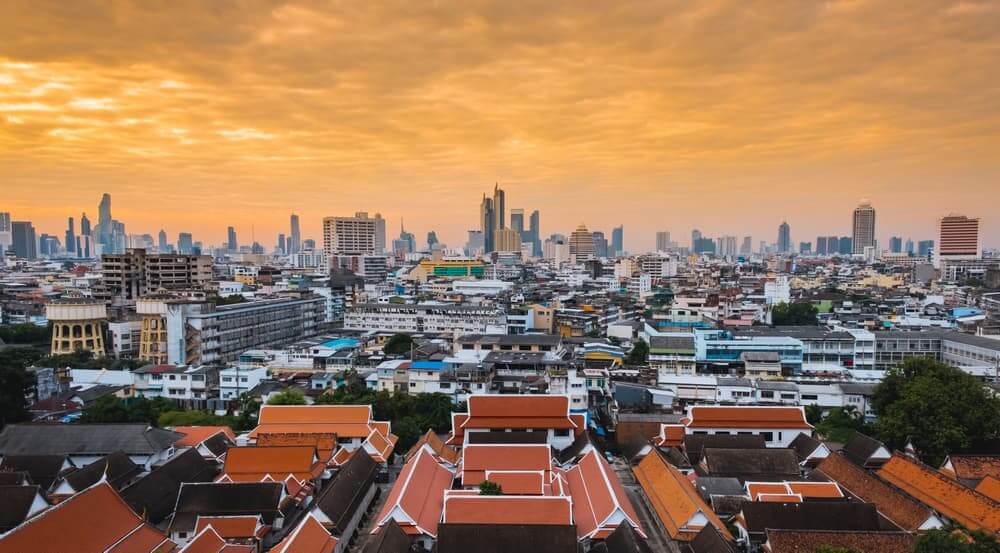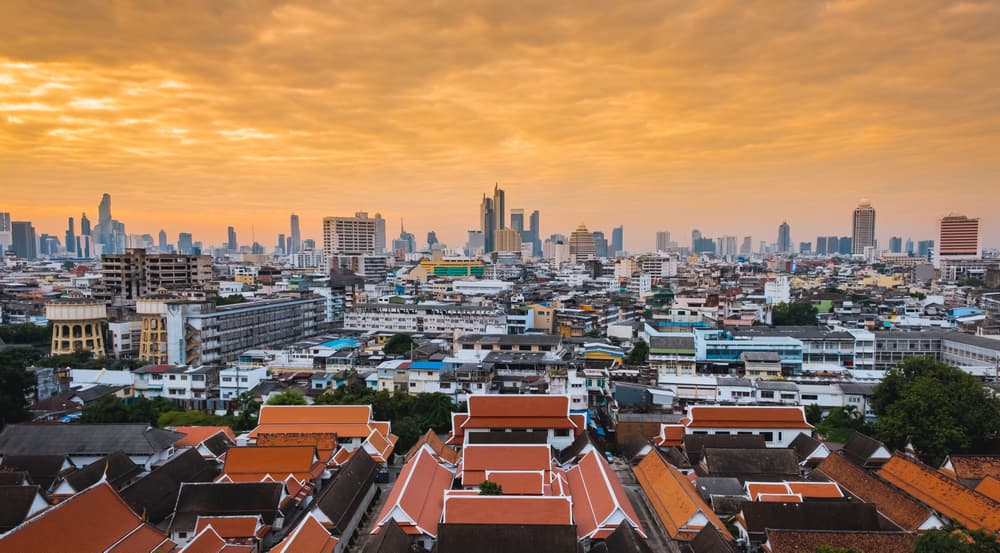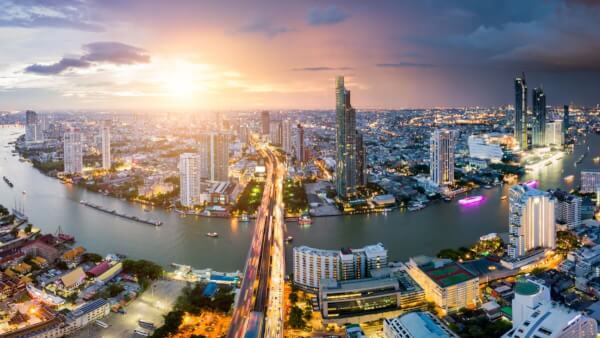Pros and cons of living in Thailand
Explore the pros and cons of living in Thailand in our guide. We’ll also discuss if Thailand is safe for expats and the best places to live in the country.

Dreaming of retiring somewhere with beautiful beaches, a tropical climate and fabulous food? Thailand is the natural choice. It’s a popular spot for expats and retirees from the UK, so you should be able to join a well-established retirement community when you arrive.
If Thailand sounds like your idea of the perfect retirement destination, let’s make it happen. Read on for a full guide to retiring in Thailand, including how to get a retirement visa and the best places in this beautiful country to retire to.
Plus, we’ll look at how best to manage your money as a UK retiree in Thailand. If you need a low-cost way to send money back to the UK, or spend your UK pension in Thailand, Wise can be a good solution. Open a Wise multi-currency account and you can avoid high bank fees and currency conversion costs.
We’ll look at how it all works later. For now, let’s start with what’s on offer in Thailand for UK retirees.
There’s a long list of reasons to choose Thailand for your retirement. Here are just a few of the most persuasive:
Beautiful weather. If the thought of cold British winters fills you with dread, escape to Thailand and its hot, sunny, tropical climate. Thailand does have a rainy monsoon season from mid-May to October, but winters can be warm depending where you are in the country.
Low cost of living. Thailand is famous for its inexpensive cost of living, but how cheap is it? To help you get an idea, a three-course meal at a restaurant is around £16 per person, the rent for a one-bedroom apartment in a city centre around £308 and a bottle of local beer just £1.30. You can buy a ticket on public transport for the equivalent of just £0.57, and a monthly pass for under £30¹.
Excellent healthcare services. There’s a reason that Thailand is a popular destination for medical tourism. It’s known for providing world-class medical care, particularly in its private hospitals. However, you will need to take out medical insurance to access healthcare here.
Stunning beaches and natural scenery. Away from its cities, Thailand has some of the most beautiful beaches in the world, along with exquisite Buddhist temples, dense jungles, diving sites and much more. You won’t be short of things to do and see here, and remember to take your camera.
And of course, there’s Thailand’s mouthwatering food, its friendly people, vibrant nightlife and welcoming, laid-back atmosphere. Why wouldn’t you want to move there?
Another reason to consider a move to Thailand is its well-developed and sizable expat communities. This can give you a safety net as you make your big move, and provide support as you settle in.
But where in Thailand should you look at retiring to? Here are just a few of the most popular retirement communities for UK expats:

Due to its excellent public transport system and wide range of amenities, Bangkok is a popular choice for many UK expats. There’s a large community of expats from the UK and all over the world here in Thailand’s capital.
In Bangkok, you can explore the city’s many restaurants, bars, shops, cultural and historic attractions. There are magnificent old palaces and temples, the beautiful Chao Phraya river, gleaming skyscrapers and bustling markets.

If you’re looking for something a little more laid-back, choose the coastal paradise of Phuket to settle in.
UK expats wanting a taste of Thailand’s natural beauty head to Phuket’s pristine white sand beaches, lush jungles and mountain hiking trails, and its fresh seafood. If you want company, there are plenty of expat clubs to join in Phuket.

This budget-friendly northern city is home to many expats and retirees from the UK, who go to Chiang Mai for its calm, laid-back atmosphere. In the centre, there’s an ancient walled city dotted with historic temples, while the rest of modern Chiang Mai is known for its excellent markets, bars and restaurants. If you love outdoor pursuits, the misty mountains surrounding the city are ideal for hiking, cycling and adventure.
Other expat-friendly places to consider in Thailand include:
If you’re planning to retire in Thailand, there are certain practicalities you’ll need to get sorted before you go. We’ll look at one of the most important ones, sorting a Thai retirement visa, in just a moment.
But first, here’s some other key information to help you with your preparations:
How much money will I need to retire in Thailand? A retired couple settling in Thailand should be able to live quite comfortably on £1,600 a month², although of course it depends on your lifestyle.
Savings. While the cost of living is low in Thailand, it’s still a good idea to have a savings cushion of at least £20,000². This can cover unexpected expenses, such as home repairs, health insurance premium increases or the purchase of a new car, for example.
Healthcare insurance. You’ll need to get comprehensive health insurance to access medical services in Thailand, the cost of which can vary depending on your age and/or pre-existing medical conditions.
Pensions. You can have your UK state pension paid to you in Thailand, but unfortunately you can’t transfer over any other UK-based pensions without incurring a tax of at least 25%³. This is because the UK’s HMRC doesn’t include Thailand on its list of qualifying recognised overseas pension schemes (QROPS)³. However, you may still be able to transfer payments from your UK bank. And while these payments are likely to incur bank and currency conversion fees, you won’t have to pay tax on this income to the Thai government³.
Buying property⁴. Thai laws prohibit foreign citizens from buying land and property in their own name, so you may have to rent property when you move there. However, there are some ways around this - such as setting up your own Thai Limited Company or entering into a long-term leasehold with a landowner. Once you’ve been in Thailand for three years, you can potentially apply for permanent residency and be legally allowed to buy your own home.
One of the most crucial things to cross off your list before you can move to Thailand is to get a Thai retirement visa.
The good news is that the Thailand retirement visa should be relatively easy to get, provided you meet the following requirements⁵:
UK citizens will need to provide a passport with at least one year’s validity remaining, along with proof they meet the financial requirements (such as bank statements).
To get your retirement visa, follow these steps:
Once you’ve had a retirement visa for at least three years, you can then apply for permanent residency⁶ if you wish to. This involves meeting certain criteria, such as being in a relationship with a Thai citizen or permanent resident, or investing a required amount in the Thai economy.
But it can be worth doing, as it can cut out a lot of the paperwork relating to renewing your visa each year. One of the most inconvenient parts of this is having to report to immigation every 90 days during your stay in Thailand⁵, which is a key requirement of the retirement visa. Plus, you can own property in Thailand as a permanent resident.
Moving to a new country is never a simple and straightforward process. You’ll have a long list of things to do before you go, but it’s nonetheless a very exciting time.
To help you plan your retirement in Thailand, here’s a step-by-step look at the key things to cross off your list:
We’ve covered nearly everything you need to know about retiring in Thailand from the UK, but there’s just one last thing to think about. This is how to manage international payments between the UK and Thailand without losing money to fees, currency conversion charges and terrible exchange rates.
Moving overseas can be expensive, but you can save money on relocation costs with Wise.
Open a multi-currency Wise account and you can send money to Thailand for low fees and the real, mid-market exchange rate. This can be super handy for covering visa fees, deposits on rental properties and other initial costs. It’s easy, quick and secure, as Wise uses sophisticated security measures to protect your money.
And once you finally arrive in Thailand, Wise keeps on working for you. It can be especially handy for receiving UK state pension payments, as they can be paid in GBP and then converted for just a small fee using the fairest exchange rate around. This could save you a small fortune compared to using banks.
When it comes to everyday spending in Thailand, you can use your Wise debit card to make contactless purchases. Currency is converted automatically at the mid-market rate whenever you spend. So there’s no need to make regular trips to the Bureau de Change, or carry lots of cash around with you.
So, that’s pretty much it - all the essentials you need to know about retiring to Thailand from the UK.
After reading this guide, you should be all clued up on Thai retirement visas, popular Thai cities for expats and the practical things you’ll need to do before your big move. The very best of luck and enjoy your sun-soaked retirement in beautiful Thailand!
Sources used for this article:
Sources checked on 28-April-2021.
*Please see terms of use and product availability for your region or visit Wise fees and pricing for the most up to date pricing and fee information.
This publication is provided for general information purposes and does not constitute legal, tax or other professional advice from Wise Payments Limited or its subsidiaries and its affiliates, and it is not intended as a substitute for obtaining advice from a financial advisor or any other professional.
We make no representations, warranties or guarantees, whether expressed or implied, that the content in the publication is accurate, complete or up to date.

Explore the pros and cons of living in Thailand in our guide. We’ll also discuss if Thailand is safe for expats and the best places to live in the country.

A list of the top banks in Thailand, including Bangkok Bank, Kasikorn Bank, Krungthai bank, Siam Commercial Bank and Krungsri Bank.

Everything you need to know about moving to Thailand from the UK. Read about visas, popular expat destinations, healthcare and more.

A guide to Thai retirement visas for UK nationals and residents: what visas are available, the requirements and how to apply.

For many westerners, holidays in Thailand can be difficult to keep track of, since many of them change dates yearly depending on the lunar calendar....

With its white sandy beaches and warm weather every day, Thailand embodies a tropical paradise. It’s a popular destination for tourists and expats looking for...